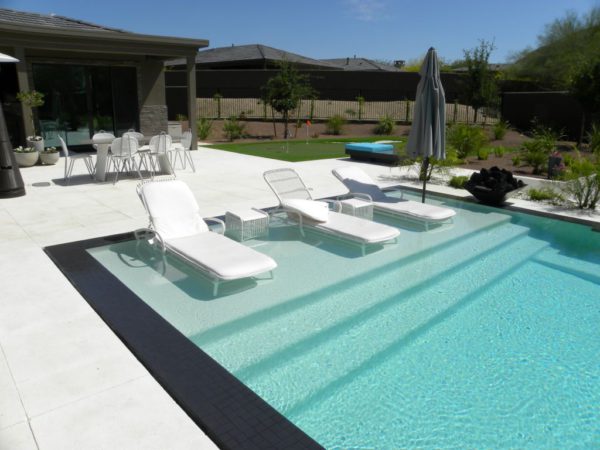
Limestone pool decking is a great way to add beauty and durability to your backyard. This type of pool decking is available in a variety of different types, including flagstone, travertine, and concrete. These materials are popular for pool decking because they are easy to maintain and they are durable and attractive.
If you want to create an elegant pool deck, look no further than limestone. Limestone is a natural stone that has a smooth texture and non-slip properties. It is also a durable material, which means that it can last for years.
You can find a wide variety of limestone in different colors, textures, and sizes. While it is not as durable as granite, it can be a good choice for your pool deck. This stone will give your swimming pool a luxurious look while at the same time being hardy enough to stand up to constant use.
The limestone that's used for the floor of your pool deck should be properly sealed to prevent stains and damage. The best way to do this is to use an impregnating sealer. Make sure that you do not use topical sealers that allow moisture to escape. These products can also damage the material.
Limestone is available in a variety of shapes and colors, allowing you to customize your swimming pool's deck. For instance, if you want a classic weathered look, you can choose a cleft bluestone.
Another good choice for a pool deck is travertine. Travertine has a similar composition to limestone, but it is a more cost effective choice. Aside from its durability, it has a beautiful, rustic look that is perfect for your backyard.
If you prefer a more traditional look, you can opt for a reclaimed slate pool deck. Reclaimed stone is more expensive, but the results will be stunning. In addition, the material is durable and can be cut in almost any shape.
Another great alternative to a traditional pool deck is a reclaimed granite pool deck. Granite is a coarse-grained igneous rock that has been quarried. Its high content of quartz and feldspar allows it to stand up to wear and tear.
In addition to being a gorgeous natural stone, limestone can be an affordable option for your pool deck. Depending on the type of limestone you select, the overall cost of your project can vary from $10 to $15 per square foot. However, this number will likely fluctuate based on the size of your project and the quality of the limestone you buy.
You can easily achieve the look of a marble pool deck by using a polymer overlay. Many modern overlay products blend sand, cement, and polymer resins to make a high-quality surface that can stand up to the harsh environment of a swimming pool. Also, polymer overlays are resistant to chemicals that can harm concrete and are designed to withstand the effects of sunlight and salt.
Stencilling your pool deck is a nice, low-cost way to get a more unique look. You can create an eye-catching pattern by using stencils that contain stones, tiles, and brick patterns. Using the correct stenciling materials will ensure a professional and seamless finish.
The natural beauty of travertine makes it a great choice for a pool deck. It also provides a non-slip surface, which is a major factor in keeping your guests safe. You can select from a variety of colors and patterns to create an elegant and functional pool area. Whether you prefer a contemporary look or a rustic one, travertine will make a beautiful addition to your backyard.
Travertine is a natural stone, which is durable and easy to clean. This means you can enjoy your pool deck for years to come. While a concrete paver will last a few months before it starts to show wear and tear, travertine can stand up to the toughest of weather conditions.
Travertine can help prevent slipping and flooding. In addition to that, it is durable enough to withstand heat and moisture. Therefore, you won't need to worry about your deck being damaged by rain, ice, or a sandstorm.
As a matter of fact, travertine is considered an eco-friendly material. Even though this stone is a bit more expensive than other materials, it is still much more affordable than concrete.
Travertine is also a good choice for a pool deck because it is not slippery, and it does not absorb water like concrete. However, you may want to consider sealing your travertine pool deck to ensure that it remains dry.
While a travertine pool deck isn't cheap, it is a very practical and stylish option. One of the most important things you need to consider is how to maintain your travertine. Among other things, you should seal your tile, and clean it regularly. Some people opt for a more rustic look by sanding and grouting the gaps between the tiles. Other people will choose a more polished style, which is more slip-resistant.
Using the right cleaning solution can make a big difference in keeping your travertine clean. A diluted version of a low pH detergent is the best bet. If stains occur, you can also try using acetone. For the most part, a pressure washer will do the trick. To do it correctly, however, you should be sure to use a light setting.
There is a little bit more to maintaining your travertine pool deck than simply washing it, but if you know what to do, it will be well worth the cost. You can find special traction treatments that are specifically designed to improve the grip of your travertine pool deck. These treatments can help you keep your footing on the ground, and they will be a boon if your pool is used by children.
Finally, a pressure washer is a great way to clean travertine tiles, and it can be used to rinse them off, as well. However, you should be careful about how you use the cleaner, as it can damage the surface of the stone.
Flagstone pool decking is a perfect option for creating a beautiful and functional outdoor space. You can find flagstone in a variety of colors, styles, and sizes, which means you can find something that fits your needs. The benefits of this material include slip-resistant surfaces, durability, and low maintenance.
Flagstone is a sedimentary rock that is very common in pool decking. It is durable and has a long lifespan. However, it does require regular maintenance. Because flagstone is susceptible to rain, oil, and chlorine, it should be sealed to protect it from these harmful elements. If you choose to have a deck made from this stone, make sure you invest in a high-quality sealant.
Flagstone can be cut into rectangles, squares, or slabs. If you want to add a more natural look, consider placing irregular rocks around the pool. This can be done in a variety of patterns, and will work with almost any design.
Flagstone is one of the most popular choices for patios, but it can also be used to create a formal pool deck. It is known for its beautiful blue color and mixed hues, and its mixed textures provide a more natural look. When installing flagstone pool decking, you may choose to set it in concrete, which helps to stabilize the material.
Another option is travertine, which is a very popular stone that resembles limestone. Travertine has a rich, luxurious appearance. It is commonly mined in Turkey, Iran, and Mexico, and is available in three finishes. Typically, travertine is polished, but it is also available in a honed finish.
Another great choice for pool decking is a combination of flagstone and travertine. This material has the look of marble, but offers the benefit of being slip-resistant. A travertine-flagstone combination can help create a beautiful Mediterranean style.
Whether you are installing a traditional or more modern pool deck, it's important to choose a material that will last. Flagstone and travertine are both resistant to moisture, but if you live in a warm climate, you may want to consider a lighter colored stone to keep your pool water at a comfortable temperature.
Pool decks are a great way to gather people around a swimming pool. They are often used as a place to relax and play. However, if you have children or pets, you should take precautions against accidental slips and falls. While flagstone is an excellent material to use for a pool deck, it is not recommended for use on an unprotected area of your property.
The key to a successful pool deck installation is to use a professional. You should choose a contractor that specializes in flagstone pool decking. This will ensure that your project is finished to your satisfaction.
The most common types of stones to use for a pool deck are flagstone and travertine. Both are durable and come in a range of colors, including blue, gray, brown, and purple. Choose a color that will blend with your surroundings.
